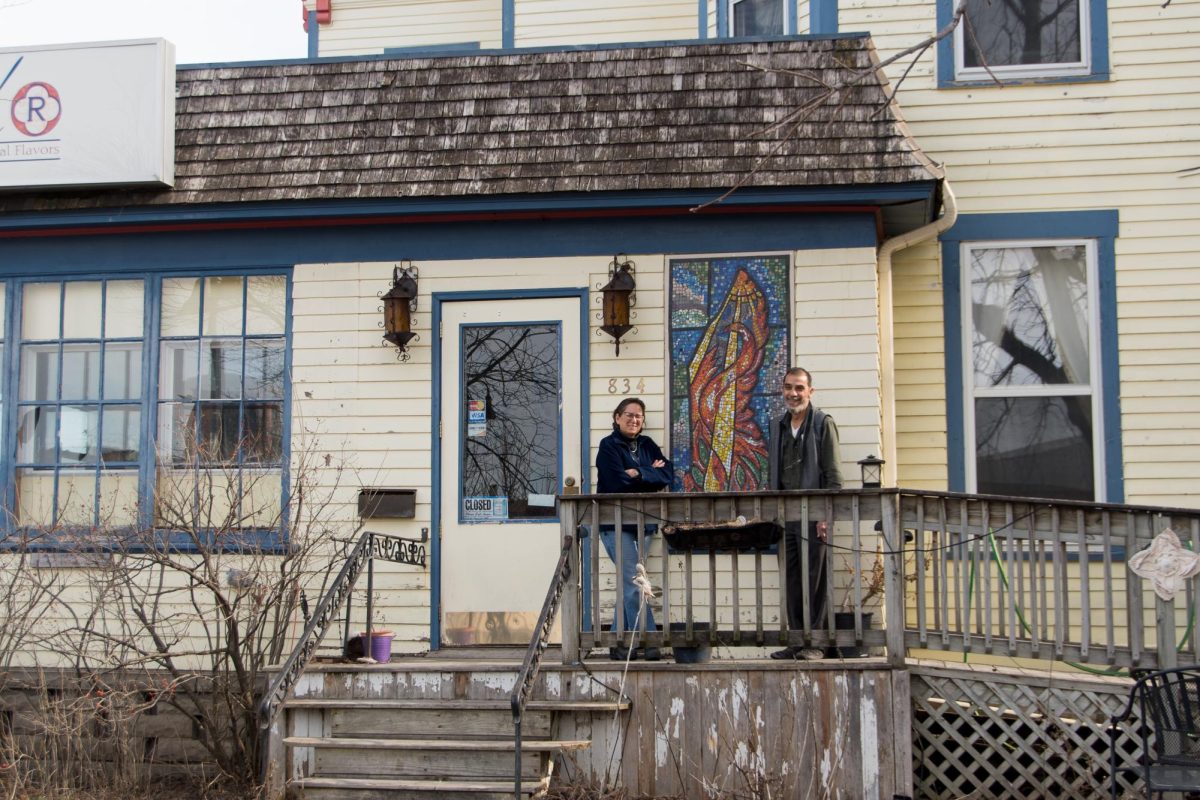How and why did you begin brewing?
It started with my captain last year—he brewed and I was really interested in what he did. I was just starting to get into beer beyond what college students drink. He showed me how to brew, and it’s a fairly simple process. I already enjoyed cooking so it went straight from there to brewing. I’ve been doing it for two years now and I have brewed six or seven batches of beer.
How do you get most of your ingredients?
I order most of my ingredients online, but you can grow your own hops, just like you can grow your own malts. I order everything online or I go to a store in Des Moines if I want more options. If I know what I’m going to brew, I’ll order the ingredients online. If I don’t know what I want to make, I’ll just go to a store and look at stuff.
What do you do with the beer once it’s ready?
Drink it, and share it—that’s the biggest thing. I like being able to share beers and be able to tell people what’s in a beer. I like to help people appreciate beer beyond, you know, Natty Light. The first beer I made was a wheat beer and it was still probably one of my better ones. I have made two brown ales.
Actually, my beer just finished. I’m going to put it in a keg today or tomorrow. I made a black lager and it’s my first lager. You use different types of yeast with lager and ales. I would say home brewing is just being able to know what went into your beer. There are so many different varieties of beer; I like being able to make my own variety.
Where do you get the recipes for different beers?
Early on, I used recipes online, so I looked for recipes or clones, which are like, if you had a beer at a bar, and you looked up the clone, it would be basically the recipe for that beer so you could re-create it, but now I come up with my own recipes on the fly. I come up with what style I want and use a calculator sort of thing that will helps you stay within the style guidelines, because there are official style guidelines. I don’t know if I always follow them but… I learned to brew mainly through reading books because I didn’t really have anyone to teach me. A lot of what I enjoy about brewing is exploring all the possibilities—trying new beers and then trying to make my own variation of that. I don’t do fancy stuff, really. I know a lot of people like to do raspberry, pumpkin, plum, but I’m not a big fan of fruit beers. My favorite kind of beer is pale ale, a really spicy pale ale. I have made two of those and they both turned out great.
What is the best beer you’ve made so far?
My best beer has been my golden ale, which is a cross between a pale ale and an imperial pale ale. It was very good.
Did you make any mistakes when you were first learning to brew?
I’ve only had one go bad—that was my amber ale. I made a mistake by putting the yeast in when the temperature was too hot. The yeast has to have an exact temperature while it’s fermenting and it got too hot, so the beer got nasty.
Like I said, I just made a black lager and lagers ferment at 52 degrees, while ales ferment at 72 degrees, so I had to put my lager into a refrigerator up in the tower where I live. The temperature kept fluctuating, so I’m worried about how it’s going to turn out, but I think it will be okay. It will be drinkable; people will drink it. That’s another nice thing about brewing – people don’t care as much about the beer as you do, they’re just glad to have free beer.
Do you have dreams of starting up your own microbrewery?
It would be really cool. I have talked to my captain who brewed and we would want to open one up. I would love to have a restaurant brewery, but I think it’s probably just going to stay a hobby. Now I have a kegerator, so I can hook the keg up to a tap and I can pour the beer out of a tap which is cool, kind of like a bar. We actually have a bar built up in the tower.
In Chicago, where I’m from, there are a lot of home brewers. My wish for home brewing is that it helps beer become as established as wine as something to actually enjoy. A good beer is something that a lot of people underrate because of the beer experience at colleges, and beyond. I would love for people to consider “Let’s go have a beer” in the same vein as “Let’s go try a nice wine.” It’s cool when people get excited about unique beers and I think within the past five or ten years, beer has become a more appreciated art form, like cooking. It’s just cooking, you know?
I’m interested in having an ExCo about beer education. Letting people know what real beer is like, what goes into real beer, what makes beer taste the way it does. I think people would be interested in it.
What makes cheap beer taste so gross?
It’s manufacturing such a large quantity, and brewers like Budweiser use rice instead of grains. Some of the grains in beer impart flavor and some of the grains turn into alcoholic sugars. Budweiser uses a few grains for flavor, and they mainly use rice for their alcoholic sugars, which is cheaper, a lot more available and they can produce such a large quantity.
I have toured a big brewery and a little brewery and there isn’t much difference, just size of equipment. Bell’s, they’re in Kalamazoo, MI, operates on a pretty large scale, even though they’re considered still a craft brewery. Goose Island used to be considered a craft brewery, but now they aren’t anymore because they were bought by Anheuser-Busch. They still make really good beers, though. 312 has really popularized wheat beers. They’ve done a good thing for the home brew community.
A lot of bigger breweries focus on clarity, like, if a beer is clear it has been prepared well. I don’t know how much I agree with that. It’s actually really hard to mess up a batch of beer because a lot of the cleaning happens through the yeast. I would say the worst thing you can do to your beer is not sanitize your equipment before you put the beer through it, because then it picks up weird stuff. Sanitation is the biggest issue in beer-making.
-compiled by Kelly Pyzik




















































